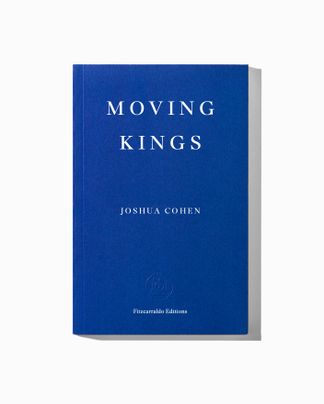An extract from Joshua Cohen’s new book Moving Kings, published today:
DAVID
(In Distraint)
Ye shall know them by their vehicles: those blue trucks that’re always cutting you off on your way to the airport, sides emblazoned with grimy white crowns, dinged bumpers stickered GOT A PROBLEM WITH MY DRIVING? CALL 1-800-212-KING!
Ye shall know them by their ads: on basic cable and drivetime radio, those billboards that’re always blocking the signs and making you miss the airport turn, with their offers of free estimates over the phone and 100% money back guarantees.
Or maybe, like more than 180,000 other satisfied customers served in all five of the boroughs and three neighboring states since 1948, you know them as the Courtly Couriers®, or the Royal Treatment Pros®, or the Removalists with the Regal Touch™—whom you’ve let into your home, to move your most precious possessions to your new home, or else to one of their six 24-hour, security-monitored, climate-controlled storage facilities conveniently located throughout the New York Metropolitan Area.
Or maybe, whatever you know is wrong, because you’ve just been reading their online reviews.
King’s Moving (David King, President, Spokesman, Container of Crises, Stresses, & the Distrained) was a licensed, bonded, limited-liability insured large small business that specialized in—one guess—moving … ’n’ storage … ’n’ parking … ’n’ towing … ’n’ salvage … ’n’ scrap, activities that demanded the bloodsweat of plus/minus 40 fulltime and 60 parttime employees, 50 vehicles, three lots, five garages, six 24-hour, security-monitored, climate-controlled storage facilities conveniently located throughout the New York Metropolitan Area—not to mention a headquarters in Jersey City, hard by the piers.
Above all, King’s Moving was a family business. Family owned, family operated. Family, family, family… Take that into account, Your Honor…
It was summer, toward the weekend of a holiday week—Moving Day (last day of the month, first day of the month), followed by Independence Day—and David King was out in the Hamptons at a birthday party for America, to which he’d been invited as a member of the Empire Club, which had required attendees to donate upwards of $4K for the privilege of drinking diluted booze and eating oversauced BBQ under the auspices of the New York State Republican Committee.
Inviting him to a party and then making him pay: that was class. That was how billionaires stayed billionaires.
And David, who’d resented even the toll to the Long Island Expressway, couldn’t help but wonder whether he’d met $4K worth of people yet—he couldn’t help valuating everything: the people, the property, the Victorianized manse shadowing the pool. His phone was vibrating again in his pocket.
He canceled the call—he was working.
He was working by attending a party at which he didn’t know anyone, or knew only that he recognized: names, faces, profiles.
It was work having to restrain himself from mentioning mergers he’d only read about, acquisitions that weren’t his, a celebrity stranger’s divorce/custody negotiations still ongoing—having to endure discussions of clean ocean and beach replenishment initiatives, when all he wanted to know was: daughter or wife? when all he wanted to know was: does anyone know where our hostis? It was work pretending he blended, he mixed, pretending he wasn’t sweating and had a second residence of his own and was a Hamptons vet and agreeing yes hasn’t the Meadow Lane heliport gotten so crowded lately? and yes isn’t Ray from Elite Landscapers just the best?
Because the fact remained that David had never been this far out on the Island before and not only couldn’t he tell you which of the Hamptons he was in, he couldn’t even tell you the number of Hamptons, or the differences between the Hamptons, or what made a Hampton a Hampton, singular, to begin with.
“Hope we’re not keeping you?” a lady said.
David said, “Come again?”
“You keep checking your phone.”
“I’ve got foreign business, never stops. It’s already July 5th somewhere.”
And he excused himself from that bezant of lawn and its assembly of skinny flagpole women flying dresses in red, white, and blue.
Ruth, his office manager, had been calling without leaving messages. Now she was gibberish txting: sorry sorry bill sick have take bill jr bball practice.
And then: anyway not finding passcard.
David made his way among tents, buffet tables of chafing and carving and bars—the trick was to keep on the move.
Kids—put David around kids and he’d fantasize about having them and only then would he recall that he had a daughter, who was an adult now—the kids were having their faces smeared native with warpaint. They bounced around on a giant inflatable galleon, parried and thrust with balloon swords.
A breeze blew in with the dung of elephant rides.
He moved among servers who made $8.75 an hourand so who made about 14 cents, 14.5833 cents, he did the figures in his head, for each minute it took them to carve him primerib or fix him a scotch or direct him and his menthols to a smoking area.
Conversations collected, as they were conducted, in circles. About stocks, about realestate, stocks. About renovations and how draining it was to open a house for the season. Apparently, to have two houses meant always neglecting one of them, at least. About alarm systems, sprinkler systems, sump pumps, white vs. black mold. About politics.
David’s politics were aspirational, inferior: he was in favor of contacts, contracts, the right to not diet, and the right to jump lines at dessert stations.
David King was a man who if a longtime employee flaked on a commitment on short notice because her exhusband was too ill to take their son to a baseball practice that wasn’t even hardball but actually softball, or if his primerib came closer to medium than to the already spineless concession that was medium rare, or if his Dewar’s 18 turned out to be Dewar’s 15 or 12 or God forbid came with an icecube or even just an extra splash of water, or if the line for the dessert station was moving so indecisively slowly that his icecream would melt before he got to the toppings he liked—it wasn’t his fault that he was so decisive about his toppings—he’d scream, he’d have a conniption, and yet once he’d fudged his sundae with a cherry atop he had all the attention, all the guilty sated childlike attention, for being lectured by an Ivy League B student on the new model Gulfstreams (though David didn’t have his own plane), the best sailing routes (though David didn’t have his own boat), the best steeplechase courses (David didn’t even have a pony), how New York State was the most regulated statein the union, the state with the highest taxes, the state with the highest energy costs, the highest fuel costs, the highest insurance premiums, and a convoluted body of tort law that made even the Nazi justice system seem unbiased and lenient, and how so and so was really the only candidate to bet on, so and so the only candidate who had real plans both for the Middle East and for midsized American businesses (our composited Ivy League B student apparently knew his audience)—the only candidate who was legitimately “Pro-Growth,” and that was the line, or the jargon, that struck him, and brought to mind the image of a small modest neat building, like some fourfloor prewar walkup in the Village, which with every vote for a Republican grew taller by the floor, until it became this big shiny tower that clockhanded all of Manhattan, and then, by association, his mind flashed below his belt, which was on its last notch, and below his gut, which hung like a panting tongue over it, to his bloodless dick, which—as if his heart had betrayed the party platform, “Pro-Growth”— dangled limp and useless.
(…)




